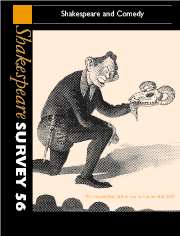Book contents
- Frontmatter
- Looking Like a Child – or – Titus: The Comedy
- Comedy and Epyllion in Post-Reformation England
- (Peter) Quince: Love Potions, Carpenter’s Coigns and Athenian Weddings
- ‘When Everything Seems Double’: Peter Quince, the other Playwright in A Midsummer Night's Dream
- Cultural Materialism and Intertextuality: The Limits of Queer Reading in A Midsummer Night's Dream and The Two Noble Kinsmen
- As You Liken It: Simile in the Wilderness
- Infinite Jest: The Comedy of Hamlet, Prince of Denmark
- Othello and the End of Comedy
- Shakespeare as a Joke: The English Comic Tradition, A Midsummer Night’s Dream and Amateur Performance
- Falstaff’s Belly, Bertie’s Kilt, Rosalind’s Legs: Shakespeare and the Victorian Prince
- The Sixth Act: Shakespeare after Joyce
- The Return of Prospero’s Wife: Mother Figures in The Tempest’s Afterlife
- Directing Shakespeare’s Comedies: In Conversation with Peter Holland
- ‘To Show our Simple Skill’: Scripts and Performances in Shakespearian Comedy
- John Shakespeare’s ‘Spiritual Testament’: A Reappraisal
- Shakespeare as a Force for Good
- Timon of Athens and Jacobean Politics
- Man, Woman and Beast in Timon’s Athens
- Rough Magic: Northern Broadsides at Work at Play
- Shakespeare Performances in England, 2002
- Professional Shakespeare Productions in the British Isles January–December 2001
- The Year's Contributions to Shakespearian Study 1 Critical Studies
- 2 Shakespeare’s Life, Times and Stage
- 3 Editions and Textual Studies
- Books Received
- Index
Shakespeare as a Force for Good
Published online by Cambridge University Press: 28 March 2007
- Frontmatter
- Looking Like a Child – or – Titus: The Comedy
- Comedy and Epyllion in Post-Reformation England
- (Peter) Quince: Love Potions, Carpenter’s Coigns and Athenian Weddings
- ‘When Everything Seems Double’: Peter Quince, the other Playwright in A Midsummer Night's Dream
- Cultural Materialism and Intertextuality: The Limits of Queer Reading in A Midsummer Night's Dream and The Two Noble Kinsmen
- As You Liken It: Simile in the Wilderness
- Infinite Jest: The Comedy of Hamlet, Prince of Denmark
- Othello and the End of Comedy
- Shakespeare as a Joke: The English Comic Tradition, A Midsummer Night’s Dream and Amateur Performance
- Falstaff’s Belly, Bertie’s Kilt, Rosalind’s Legs: Shakespeare and the Victorian Prince
- The Sixth Act: Shakespeare after Joyce
- The Return of Prospero’s Wife: Mother Figures in The Tempest’s Afterlife
- Directing Shakespeare’s Comedies: In Conversation with Peter Holland
- ‘To Show our Simple Skill’: Scripts and Performances in Shakespearian Comedy
- John Shakespeare’s ‘Spiritual Testament’: A Reappraisal
- Shakespeare as a Force for Good
- Timon of Athens and Jacobean Politics
- Man, Woman and Beast in Timon’s Athens
- Rough Magic: Northern Broadsides at Work at Play
- Shakespeare Performances in England, 2002
- Professional Shakespeare Productions in the British Isles January–December 2001
- The Year's Contributions to Shakespearian Study 1 Critical Studies
- 2 Shakespeare’s Life, Times and Stage
- 3 Editions and Textual Studies
- Books Received
- Index
Summary
The disease of Victorian England was claustrophobia - there was a sense of suffocation, and the best and most gifted men of the period, Mill and Carlyle, Nietzsche and Ibsen, men both of the left and of the right, demanded more air and more light.
(Isaiah Berlin, 'John Stuart Mill and the Ends of Life')For sweetest things turn sourest by their deeds; Lillies that fester smell far worse than weeds.
(William Shakespeare, Sonnet 94)For two decades now Shakespeare scholars have been busy exposing the use of this writer in the legitimation of various oppressive regimes - sexual, imperialist, racial, class, and so on. To put it crudely: as World's Most Canonical Author, Shakespeare has become synonymous with the Establishment. Not a few Shakespeare critics would now agree with William Hazlitt that Shakespeare 'had a leaning to the arbitrary [i.e. anti-democratic] side of the question' - or, perhaps, would ruefully second Walt Whitman's accusation that, his 'dramas' being 'the superbest poetic culmination-expression of feudalism', Shakespeare had nothing to offer democracies.
George Orwell once said some authors were 'worth stealing', a truth demonstrated by both left and right attempting to claim them as their own. But many left-wing Shakespearians now concur with their ideological opponents that this writer naturally - or, at least, regularly - suits a conservative agenda.
- Type
- Chapter
- Information
- Shakespeare SurveyAn Annual Survey of Shakespeare Studies and Production, pp. 203 - 214Publisher: Cambridge University PressPrint publication year: 2003



